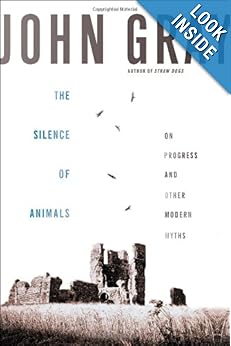In foreign policy journal The National Interest, editor Robert Merry reviews John Gray’s The Silence of Animals, discussing, inter alia, the author’s belief that secular humanism is toast. That’s for another day.
 Here note that, in his argument against the notion of progress, Gray talks about human descents into madness and murder under extreme circumstances, recalling the ravaged Europe of 1944. As Merry summarizes it:
Here note that, in his argument against the notion of progress, Gray talks about human descents into madness and murder under extreme circumstances, recalling the ravaged Europe of 1944. As Merry summarizes it:
Observing the struggle for life in the city [Naples], Malaparte watched as civilization gave way. The people the inhabitants had imagined themselves to be—shaped, however imperfectly, by ideas of right and wrong—disappeared. What were left were hungry animals, ready to do anything to go on living; but not animals of the kind that innocently kill and die in forests and jungles. Lacking a self-image of the sort humans cherish, other animals are content to be what they are. For human beings the struggle for survival is a struggle against themselves.
Of course, he puffs for Darwin in an earlier, similar work, Straw Dogs: “Darwin showed that humans are like other animals, … ”
And here is precisely where Darwinism deserts him. As both his reviewer Merry (and he himself, it turns out) perceptively note,
Humans are different in a crucial respect, captured by Gray himself when he notes that Homo sapiens inevitably struggle with themselves when forced to fight for survival. No other species does that, just as no other species has such a range of spirit, from nobility to degradation, or such a need to ponder the moral implications as it fluctuates from one to the other.
Very few human beings have ever thought that “every man for himself,” “dog eat dog,” or “it’s a jungle out there” was normal or right. Nor do humans admire the pack instinct or the herd instinct. These are terms of insult or abuse. Animal methods of organization or absence thereof do not represent a normal human way of living. So humans are not “like other animals.” Merry continues,
But, whatever human nature is—with all of its capacity for folly, capriciousness and evil as well as virtue, magnanimity and high-mindedness—it is embedded in the species through evolution and not subject to manipulation by man-made institutions.
That last part is mistaken. It is not embedded either by evolution or by institutions.
![]() “Evolution” did not create this situation; it is powerless to create it. Evolution could only create better adapted packs, herds, or jungles. The judgement that such a way of life is “wrong” (not just unpleasant or unprofitable or contrary to our species’ instincts*, but just plain wrong even if all those other categories did not necessarily apply) proceeds from another source.
“Evolution” did not create this situation; it is powerless to create it. Evolution could only create better adapted packs, herds, or jungles. The judgement that such a way of life is “wrong” (not just unpleasant or unprofitable or contrary to our species’ instincts*, but just plain wrong even if all those other categories did not necessarily apply) proceeds from another source.
East and West have offered different accounts but no reasonable, serious account of human nature suggests that it is just a hop, skip, and a jump from the jungle to the symphony hall.
* Some chosen ways of life routinely and intentionally violate species instincts, as the monastic way—widespread at various times and places, both East and West—attest. Indeed, while there may be a human instinct for civilization, much of civilization consists in violating “natural” instincts. The fact that we humans are typically at war with ourselves should have warned against both Darwinism and pop psychology. But these days, they are a soft, legal drug.